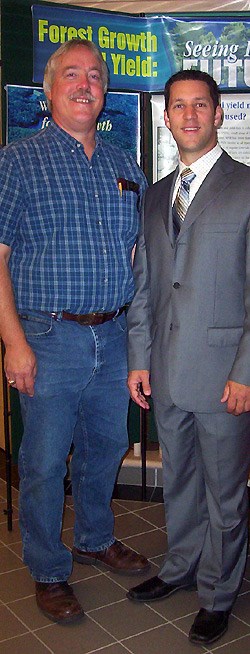(EDITOR'S NOTE: This article has been expanded from an abbreviated version that appeared earlier today.)
A pilot project to produce energy from wood waste was announced at the Ontario Forest Research Institute this morning.
Ontario Minister of Natural Resources David Ramsay was supposed to be in the Sault for the announcment but had to leave Sault MPP David Orazietti with the chore of announcing an energy-making process using hot balls of steel.
After Ramsey was unavoidably delayed, Orazietti got to tell the media all about the new project that will see a portable, self-contained bio-refinery prototype going to areas where unused forest biomass (branches and twigs) are piled up waiting to rot.
The idea is to convert those branches and twigs into usable bio-oil.
The dry distillation bio-refinery uses stainless steel balls that are super-heated so that when wood waste is dumped on them, it's quickly converted into charcoal, gas and bio-oil said Dr. Tom Noland.
Noland, a research scientist for the Ontario Forest Research Institute of the Ministry of Natural Resources, is shown with Orazietti at today's announcement.
Orazietti said the pilot project is now underway in partnership with Advanced BioRefinery Inc., of Ottawa.
A prototype portable refinery has been constructed by Advanced BioRefinery and will be tested throughout the winter.
"It is expected to be delivered and begin operation in the field in the spring of 2006," said Orazietti.
Where it will first be deployed remains to be seen, but the portable bio-refinery could be the first of many to come, he said.
"If the three-year pilot project is a success, we can expect to see more refineries operating in northern Ontario in the years to follow," said Orazietti.
Evaluation of the project will be done at Ontario Forest Research Institute and by Upper Lakes Environmental Research Network and other government and forestry-sector partners.
Noland said that the project has been possible for some time, but lower oil prices and costs to transport wood waste from forests have made it uneconomical until now.
"With the cost of oil over $50 a barrel and going considerably north of that, the project has become feasible," Noland said.
He added that creation of a portable refinery made the cost of transporting wood waste a moot point in most cases.
There are places the portable refinery can't get to, he said, but it will go pretty much anywhere a logging truck can travel.
There are some costs involved in moving the piles of slash left from logging operations to the logging road where the portable refinery is parked, but these are minimal compared to what it would cost to gather it all and transport it to a central refinery.
"A single bio-refinery can process up to 50 tonnes of forest biomass every day," said Dr. David DeYoe in a Ministry of Natural Resources media release.
"A sustainable supply of unused forest waste or biomass is available in Ontario's forests, such as tree tops, limbs and waste left after logging operations; trees destroyed by fire, insects and disease; and logs that cannot be sold," said the release.
Bio-oil produced in Advanced BioRefinery Inc.'s transportable refinery could be used to produce heat and electricity.
Or, it could make value-added bio-products such as plastics and glue, said Orazietti at today's announcement. "There is a considerable amount of waste in the forest presently," said Orazietti. "Approximately four million tonnes per year [of waste is produced], and it's something that can be used to create bio-energy," the MPP said.
Orazietti said that about 10 million tonnes of slash are estimated to be in Ontario forests right now and another four million tonnes is generated each year.
So the potential for energy creation is good, he says.
"At present, about one percent of Ontario's electricity capacity is gained from the use of biomass and so there is an incredible potential," said Orazietti.
